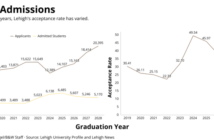
John Lindenau
I sat on my couch last year watching the NFL draft with my friends when the fifth round began.
I eagerly waited for the Kansas City Chiefs to make their selection, and with the 165th pick they chose Tyreek Hill, a wide receiver out of Western Alabama — a controversial figure.
The commentators mentioned Hill had character flaws, but I was confident the Chiefs organization and locker room would be able to iron those out. I was hoping they would be able to turn him around much like they turned around Marcus Peters, a cornerback who went from getting kicked off of his college team to being named Defensive Rookie of the Year.
This was all before I realized the extent of Hills personal problems.
To find out more about Hill I went online — the character flaw referenced by the commentators was abuse. More specifically, he abused his girlfriend, who was pregnant at the time.
I was shocked, and the fact that the Chiefs would choose someone like that left a bad taste in my mouth. I didn’t want someone on my favorite team who thought abuse was OK. I didn’t want someone like that to corrupt the locker room and ruin the team I had built myself around.
Then Hill scored a touchdown, and another, and just wouldn’t stop scoring on plays you can only describe as incredible.
He shed tackles to go for a 68-yard touchdown. He caught punts and ran so fast it was impossible for the other team to even come close to tackling him. There’s a famous moment in which Hill high-fived teammate De’Anthony Thomas while returning a punt for a touchdown against the rival Denver Broncos.
Hill seemed unstoppable, and little by little I forgot about his past.
I didn’t realize I was beginning to warm up to the new playmaker. I began to forgive his actions and take a deeper look into what had happened in his past.
Hill acknowledged he had abused his girlfriend and agreed to any and all punishments deemed necessary. He agreed to follow all of the steps in his probation agreement. He submitted himself to domestic abuse evaluation, an anger management course and a year-long batterers program designed to help him atone for what he did.
I can make any excuse for his actions — that he was young, that he didn’t know what he was doing or that his upbringing taught him his behavior was OK. But at the end of the day, he committed a heinous crime. I can only say he’s taking the steps to fix what he did, and I became willing to give him another chance.
If Hill had been on any other team, I don’t know if I would be willing to forgive and forget. I probably wouldn’t have taken a deeper look into his sentencing, and if he were on a rival team I don’t think I would ever be willing to look past and see the man underneath it all.
What Hill did was atrocious — there is absolutely no doubt about that — and he deserves every bit of hate that was thrown his way. But as of right now, I have forgiven him.
This forgiveness, however, begs the question: Am I forgiving him because of his performance, or because I truly believe that he can change for the better? It also begs the question of why Hill is different to me than Ray Rice, who punched out his fiancee in an elevator, or Adrian Peterson, who beat his own son.
I know in my own mind I haven’t forgiven them for their infractions, yet I forgive Hill. On some level, I do think if Hill had not been playing at a level to be considered a contender for Offensive Rookie of the Year, I wouldn’t have forgiven him. And if Peterson had been on the Chiefs and rocked the house, I might have been quick to forgive him, too.
But in the end I’m not sure, and there are different answers for everyone.
This leads us to something even greater. In a sport that is inherently violent at its core, to what extent should ethics even matter in the NFL?
Maybe the personal lives of the players should be just that — their own personal business. Should we check our values at the door, or should we take a step back, say this isn’t OK and revoke our fanhood no matter how much it means to us?
To me, if a player refuses to make amends, they don’t deserve my forgiveness. But if they are actively trying to improve themselves and their community, maybe they deserve our support.
—
John Lindenau, ’20, is an assistant sports editor for The Brown and White. He can be reached at [email protected].





Comment policy
Comments posted to The Brown and White website are reviewed by a moderator before being approved. Incendiary speech or harassing language, including comments targeted at individuals, may be deemed unacceptable and not published. Spam and other soliciting will also be declined.
The Brown and White also reserves the right to not publish entirely anonymous comments.